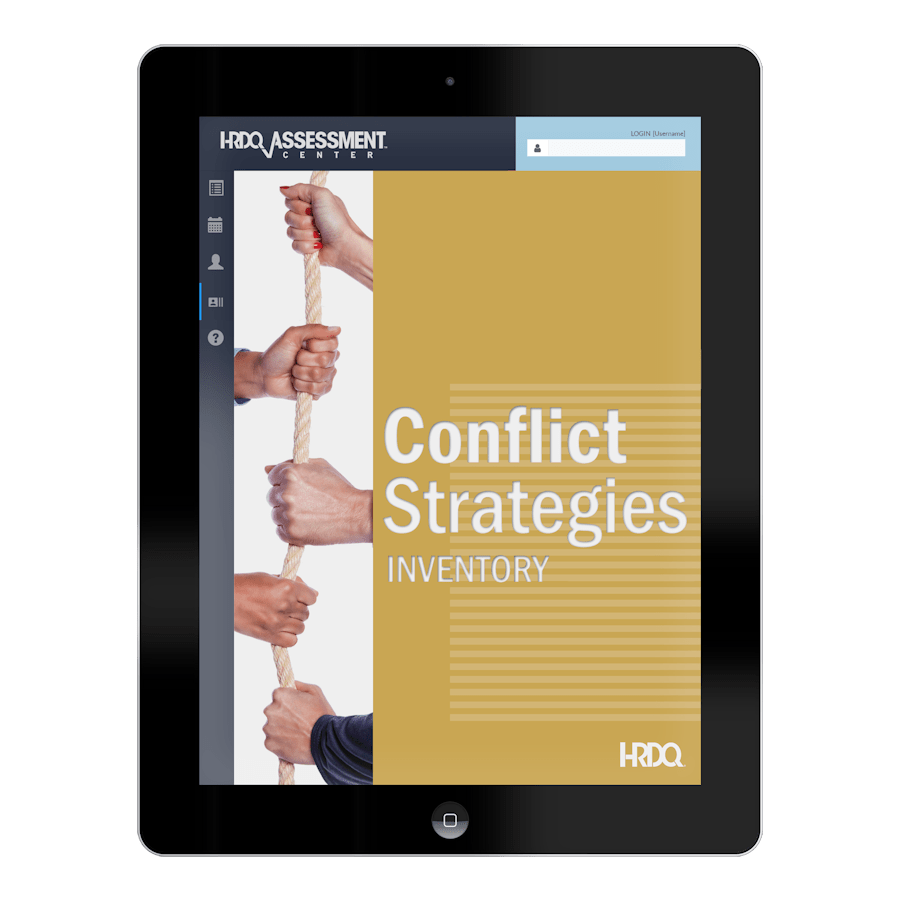
Share
Effective Conflict Resolution Strategies In The Workplace
HRDQ StaffIf you work in an office, you know conflicts are part of the game. In fact, according to a recent study from CPP, 29% of employees say they spend most or all of their time dealing with workplace conflicts.1 But conflict can also be a force for good—if you handle it the right way. Your conflict resolution strategies in the workplace will influence whether your people are constantly looking for ways to grow—or for a way out. To help you manage conflict in your organization, here are seven of our favorite strategies for resolving conflict at work.
Focus on the Problem

People take conflicts at work seriously. In fact, about 70 percent of the time, people take conflicts personally even when they are specifically told not to, according to Stanford professor Lindred Greer. The takeaway? Putting blame on someone for a workplace conflict is one of the fastest ways to keep the conflict going.
To help resolve, focus on the problem. Instead of, "You take three days to respond to my emails," try "I feel like we have a problem with communication. Do you think so, too?" Approach the discussion as a way to improve your work processes so that everyone can be more effective. You'll come across as more reasonable and make it easier for others to come around to your point of view.
Don't Think About Who's Right
If you're directly involved in a conflict, it's easy to think that the path to resolution is to show that you're right and the other person is wrong. If you have a history of clashing with a particular colleague, this is an especially easy trap to fall into. But it won't get you anywhere.
Approach any discussion from a standpoint of mutual respect. Try to understand where the other person is coming from, and focus on solutions. You'll be more likely to reach insights that will benefit your whole team and your project.
Embrace Conflict
When a conflict flares up in the workplace, the worst thing you can do is pretend it's not happening. Be proactive about addressing it.
Timing is everything. In general, it's best to address the conflict as soon as you can to prevent it from getting worse. If tempers are running high, it may be prudent to allow a bit of time for everyone to simmer down. If you're directly involved, you can take your own emotional temperature to help guide you. But as soon as you can, talk it out.
Make Space to Talk
In our hyper-connected world, it's more challenging than ever to give our full attention to anything. It's tempting to think you can resolve a workplace issue the same way you communicate about anything else—over email, Slack, or Teams. But email or electronic messaging leave lots of room for misunderstanding, particularly when dealing with a sensitive issue. And if an issue that's been "dealt with" flares back up again, it'll be all the more frustrating for everyone.
Set aside time to talk face-to-face. Invite your colleague to suggest a place and time to help get buy-in. It won't be easy. Be prepared to show some vulnerability and check your immediate reactions in the interest of reaching a resolution.
If you're trying to work something out directly with a colleague, they may not bring the same solutions-oriented mindset to the conversation. You can limit this risk by setting some goals at the outset of the conversation: "I know our project has been delayed, and I'd like us to figure out some ways to work more efficiently."
Offer Validation
Whether you're directly involved in a conflict or mediating conflict between colleagues, listen to what they're saying without interruption. At an appropriate moment, repeat it back to them, more or less in their own words.
Suppose a colleague says, "I've made a lot of suggestions for improving our program, but you always reject them. It's really frustrating." At an appropriate moment, you might reply, "So what you're saying is, you're frustrated because I always reject your suggestions for our program."
When you take the time to really listen and then say what you're hearing out loud, you're not just validating what your colleague is saying. You're demonstrating that you are listening, which will make it easier for them to open up and share how they're feeling with you. This simple conflict resolution strategy can help to enhance your ability to work together to reach a resolution.

Admit When You're Wrong
Nobody's perfect. Truly productive conversations expose areas where our processes aren't working well, so that everyone can work better. That may require you to admit things you could have done better as well. From being more proactive about communication to considering others' feelings and setting expectations, try to be open to admitting your own mistakes.
If you've made a mistake, own it. It may be uncomfortable. And it may not be easy. But sharing what you could have done better and how you want to do things differently in the future makes it safe for others to do the same. When you do that, you'll also help build a culture of growth, where mistakes are seen as opportunities to learn and move forward.
Seek Solutions
If all that happens during a conversation is that people air their frustrations, you won't get very far. When you see shared perspectives or points of agreement, highlight them. If you are having a disagreement related to work processes, you might say, "Well, it sounds like we both really want to deliver the best program we possibly can."
Once you've worked out a solution, communicate what you've learned. Document the main takeaways from the meeting and the actions that everyone agreed to take to resolve the issue. By doing this, you'll have something to refer back to in the event issues arise again. You'll also help build a culture of growth that will positively impact everyone in the organization.
Your Turn
Healthy workplace teams handle conflict in productive ways. They validate all team members' point of view, they create a space for everyone to be heard, and they work toward solutions together.
All teams work better when they handle conflict positively. At HRDQ, we offer a range of workplace conflict resolution training materials to fit the needs of any organization.
For more great conflict and stress management assessments and training materials, explore our full Conflict Management Training collection. Shop Now!






















































![[Guide] Mapping the Path of Erikson's Developmental Process](http://hrdqstore.com/cdn/shop/articles/Eriksons_Developmental_Process_520x500_9915a36f-58b9-4f82-aa72-8ab099a7d229.jpg?v=1741640982&width=500)


1 comment
I agree with what you said about how it’s best to address conflict in the workplace as soon as possible to prevent making the situation worse. I imagine if you manage a startup company, it’s best to ensure that all employees are treated fairly and equally by doing conflict resolution training. I’ll be sure to consider anti-racism training as well for my company once I find good mediation services to hire. https://stoutecommunications.com/anti-racism-training-1